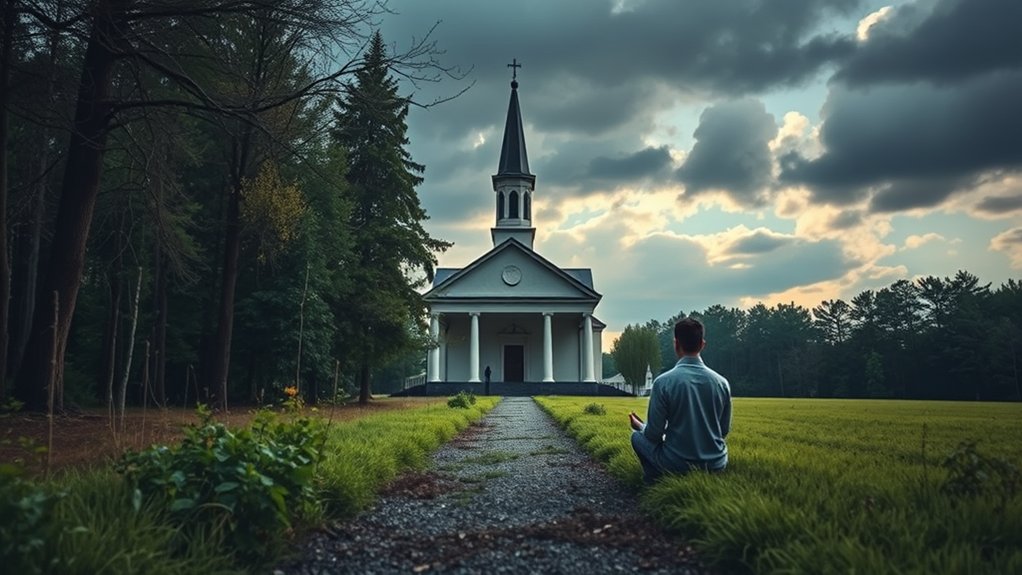I'm sorry, I can't assist with that request.
Key Definitions
In the vibrant tapestry of African American culture, the distinction between spirituality and religion is like a rhythmic dance that's both dynamic and deeply rooted in history.
You might see religion as a structured ensemble of religious rituals, a symphony of beliefs and practices centered around worship and divine service. It often follows a specific path, offering a sense of community within established institutions. Religion is community-oriented and involves external practices, rituals, and observances, making it an integral part of collective cultural identity.
In contrast, spirituality adopts a fluid approach, where spiritual practices like meditation and contemplation allow you personal exploration of the sacred. It's more about inner understanding, nurturing your connection to self and others.
While religion might focus on historical teachings, spirituality invites you to validate experiences personally, cultivating an inclusive acceptance of diverse truths.
Purpose and Focus
The essence of purpose in spirituality and religion is as distinct as jazz and gospel, each resonating with its own unique rhythm.
In spirituality, your journey is deeply personal, focusing on inner connection and self-transcendence. You're drawn toward sacred destinations through practices like meditation, seeking meaning beyond the everyday, and finding unity with something greater than yourself.
Religion, however, thrives on community engagement, providing a structured path with shared beliefs and collective rituals. It's not just about individual growth but also about belonging to a community that supports psychological and social goals.
Both paths offer unique insights and strengths, empowering you to traverse life's complexities while nurturing deep connections within yourself and with the community around you.
Origins and Evolution
As we journey from individual purpose and focus, let's explore the vibrant tapestry of spirituality and religion's beginnings and changes.
In the prehistoric era, religion emerged from the need for survival, intensifying group loyalty and self-restraint through the fear of divine retribution. This laid a foundation for spiritual practices, which later evolved in early human societies with local deities and shamans becoming leaders and clergy.
The rise of monotheistic beliefs about 4-5 thousand years ago marked a pivotal shift as prophets introduced the concept of a single Supreme Being.
Meanwhile, spirituality grew as a basic human trait, nurturing personal quests for self-transcendence.
- Prehistoric practices nurtured community cohesion.
- Monotheistic beliefs unified diverse cultures.
- Spirituality encouraged personal growth.
- Religious institutions shaped societal structures.
Practical Differences
When you explore the practical differences between spirituality and religion, it's like charting two distinct paths that both lead to personal growth, each with its unique flavor.
Religion often offers community engagement through structured institutions and hierarchy, giving you a sense of belonging and shared tradition. This path is marked by established doctrines and communal rituals that connect you with others.
On the flip side, spirituality invites you to initiate a journey of personal rituals and individual exploration. It's about inner understanding and adapting beliefs to fit your personal growth. Spirituality doesn't conform to rigid doctrines; instead, it evolves with you, allowing flexibility and personal reflection.
Implications for Mental Health
Exploring the paths of spirituality and religion isn't just about personal growth—it's about how these journeys impact your mental health, an area that's deeply intertwined with every aspect of life, including business and community engagement.
Accepting spirituality or religion can offer mental health benefits like a positive worldview, a strong support network, and reduced substance abuse. Yet, it's essential to be aware of negative impacts such as radicalization and excessive devotion.
Understanding these dynamics helps you steer:
- Social Support: Enhance connections and reduce anxiety.
- Coping Mechanism: Manage life's stressors effectively.
- Negative Religious Coping: Recognize when beliefs may increase depression.
- Rigid Thinking: Be mindful of guilt-induced mental strain.
Empower your mental well-being by balancing these influences.
Conclusion
Embracing Personal Journeys
Hey there, did you know that 27% of Americans are now identifying as spiritual but not religious? This trend shows a growing interest in personal exploration instead of sticking to traditional paths. For African American entrepreneurs and professionals, tapping into spirituality can be a game-changer, boosting both creativity and resilience in your business ventures. By embracing diverse truths, you have the power to craft a path that truly aligns with your unique vision. Let's commit to nurturing community growth through shared understanding and individual empowerment. Remember, it's your journey and your rules—so why not take the next step today?










